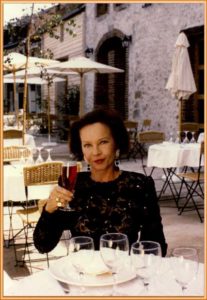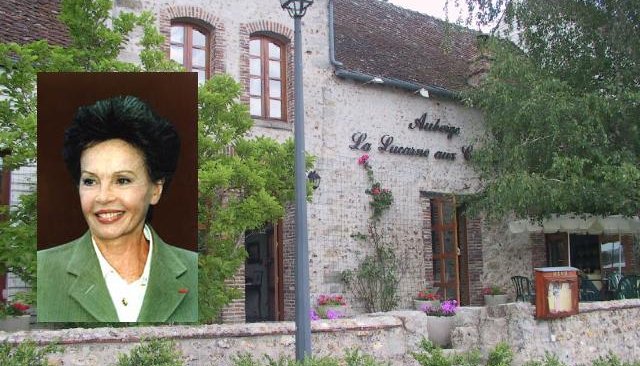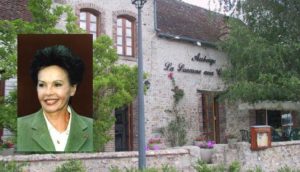
– Leslie Caron and the Auberge La Lucarne aux Chouettes
– An Interview with Leslie Caron
Leslie Caron and the Auberge La Lucarne aux Chouettes
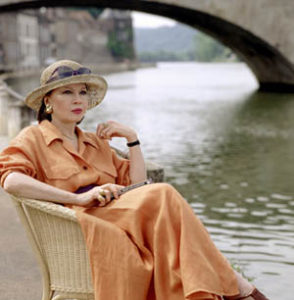 The telephone rang.
The telephone rang.
“Hello?” I said as I was admiring the intricate beam construction in my room known as the Loft at the Auberge La Lucarne aux Chouettes (The Owls’ Nest).“Hello. Whenever you’re ready,” answered the proprietor calling from the front desk speaking in her voice that is a combination of proper British pronunciation and French cadence.
“I’ll be right down.”
I walked out of my room, down the stairs, past the kitchen, through the restaurant, and into the reception area where the proprietor was waiting for me to join her for lunch. The owner is the one and only Leslie Caron who, in addition to her internationally acclaimed acting and dancing career, has earned a reputation in these last two decades as one of France’s most respected restaurateur/innkeepers in France.
Madame Caron was just turning around in my direction when I entered the reception area to meet her. After introductions, we walked out to the terrace to choose a table for our lunch. This unique darling of the movies has not lost her ability to make an impressive appearance in an unassuming, yet confident manner. She wore a tweed jacket and slacks. Her dark hair was straight and neck-length, pulled back in a headband. The sparkling blue eyes and warm smile have not changed. Neither has her trim figure and light step. She was attending to her dog, Prunelle. A Maltese terrier, Prunelle, stayed closed to Leslie.
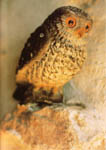 “Does she speak English?” I asked.
“Does she speak English?” I asked.
Slight grin. “Err, she understands English. But she’s old and she’s lost a lot of her hearing.”
“How old is she?”
“I’m not really sure. She belonged to a friend of mine who is not well. So Prunelle is with me now.”
As we walked out to the terrace, Prunelle kept up with Leslie.
“She seems to still be able to move fairly well,” I observed.
“Yes. She takes medicine like those of us who need it. Let’s take a table.”
The Birth of the Auberge
In the rolling countryside of Burgundy, not far to the west of the town of Chablis, there is a beautiful little village called Villeneuve-sur-l’Yonne. Near the center of town is a locally well known reference point. It’s a 13th-century stone bridge which crosses over the River Yonne. As the 1990s began, it was thought of as no more than a means passing through a town that was on the decline. Buildings were no longer kept up, stores were closing, the people were leaving, and property values were dropping. But along came Leslie who did not like the direction Villeneuve was headed. So when an opportunity presented itself, she took action and opened a restaurant/inn on the river next to the bridge. That would be the beginning of rescuing the town from its economic downward spiral.
Leslie had been coming to Villeneuve for many years since her close friend, the famed director, Jean Renoir, introduced it to her. She subsequently bought her own place near the river that was once a millhouse. The town, an hour and a half drive southeast from Paris, became a getaway for her and her family.
In the mid-1980s, a group of buildings next to the bridge were put up for sale, a building used for storing river barge and two adjacent structures. The mayor at the time wanted to level them and put in a parking lot. To avoid such an eyesore, Leslie and her son, Christopher Hall (from her marriage to British theater and film director, Peter Hall), decided to buy both buildings that were selling at a low price.
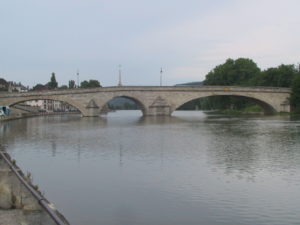
Once the buildings were hers, it was a matter of deciding what to do with them. The first thought was to renovate the buildings into a dwelling for friends to stay when visiting. However, the cost to fix up a place of that large size was too costly. So it was necessary to find a purpose that would generate revenue. The idea of operating an auberge soon evolved. An auberge, or inn, can functionally mean different things. In some cases, an auberge is a hotel that may or may not have a restaurant. In other cases, as The Auberge La Lucarne aux Chouettes, it is a restaurant that also has a few rooms.
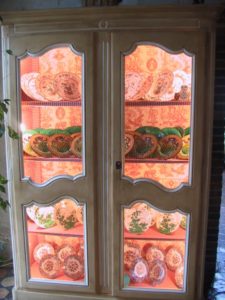
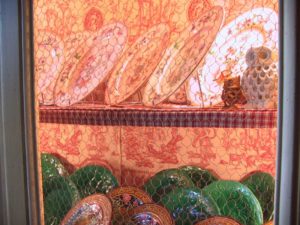
Leslie set a budget, negotiated with her new partners and financiers, and went to work. Very few people around her believed she was capable of doing all that was necessary to start and run a business. In time, she would stun them all.
She supervised the construction. Her early years growing up in Paris prepared her for it. Her grandparents were accomplished builders and she learned while watching many of their construction projects often watching the mason workers cutting stone. Initially she consulted a French contracting firm, but their estimates were ridiculously high. So she dropped them and brought in a more reasonable team of builders from England. She housed and fed them while they restored the buildings to her specifications. Whether she was on site or on the set filming a movie, she directed the progress of the construction. She also decorated and furnished the auberge.
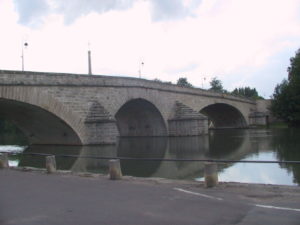 What was once a dilapidated storage area was now a small tastefully provincial inn. Upon entering the front door, you will find yourself in the small reception at the registration counter and kindly greeted by the manager, Dominique Inagaki. Along the left wall is a cabinet of antique plates. The room on the left is the bar/breakfast room decorated with posters and photographs of Leslie’s acting career – something she preferred not to do, but her staff talked her into it reasoning that they wanted the guests to know who the owner is, particularly when she wasn’t on the property. On the opposite side of the reception is the dining room, the center piece of the auberge. It is a large room with a high ceiling, oak beams, and an open fireplace. The floor is lined with red antique tiles that she selected. The room has light airiness about it due to the white stone walls and two large French-door windows. As you walk out of the room through the large exits, you come to the terrace that looks out on the bridge and is shaded by magnolia and birch trees.
What was once a dilapidated storage area was now a small tastefully provincial inn. Upon entering the front door, you will find yourself in the small reception at the registration counter and kindly greeted by the manager, Dominique Inagaki. Along the left wall is a cabinet of antique plates. The room on the left is the bar/breakfast room decorated with posters and photographs of Leslie’s acting career – something she preferred not to do, but her staff talked her into it reasoning that they wanted the guests to know who the owner is, particularly when she wasn’t on the property. On the opposite side of the reception is the dining room, the center piece of the auberge. It is a large room with a high ceiling, oak beams, and an open fireplace. The floor is lined with red antique tiles that she selected. The room has light airiness about it due to the white stone walls and two large French-door windows. As you walk out of the room through the large exits, you come to the terrace that looks out on the bridge and is shaded by magnolia and birch trees.
Building It Was the Easy Part
Leslie dealt with the usual delays and hassles involved with a structural renovation, but she still completed the construction and decorating in a year and a half. The restaurant was ready for its grand opening in June 1993. The four guest rooms above the restaurant were finished a month later. Now she had to figure out how to make this work. The goal was to make the auberge a viable and distinguishable operation.
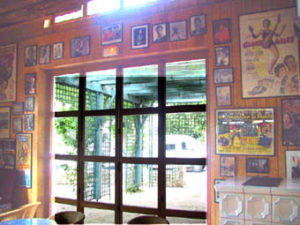
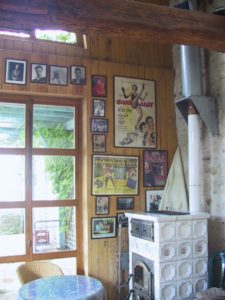
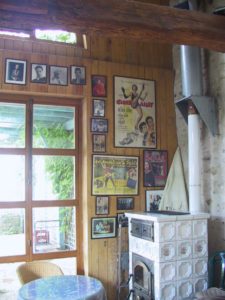
Granted her internationally well known name gave the auberge a certain cachet that was sure to attract customers. But she was aware that her name recognition alone would not be enough for her to be taken seriously in the French culinary world. Although she had no prior experience managing a business, she had key strengths that aided her in taking on this challenge. First of all, she had a focused plan. The idea was to create an authentically rustic, but elegantly simple restaurant/inn with a comfortable atmosphere that made her customers feel genuinely welcome. She envisioned that the restaurant would be a high quality place to dine, but at an attractive price. Also, all her experiences as a performer prepared her for this. In her view, running a restaurant was merely another venue to create and perform in front of an audience. As a seasoned entertainer, she knew that audiences appreciate and applaud performances that genuinely come from the heart and soul. That inspired her to take on this unusual opportunity with an unwavering enthusiasm and commitment to create a production of dining entertainment that would make her audiences of customers leave satisfied and return for repeat performances. Opening the restaurant would also be an artistic venture that would allow her to express herself in a way that artists don’t often get to do. This time it was her show that she could control. She would be the director.
The next three years were a struggle getting the restaurant to run smoothly, costumers at the tables, and visitors in the rooms. But with her strong work ethic and shrewd strategic business sense, she made progress. She personally did a lot of the marketing. She left information with the big hotels in Paris and put brochures on windshields in parking lots at local shopping centers. She convinced travel writers to include the auberge in their guide books. She came up with promotional ideas such as quick lunch menus to attract local business diners. She paid close attention to all the details of the inn: the quality of the food and ambience of the property; the hiring and conduct of the staff; the comfort in the rooms; and the satisfaction of her guests.
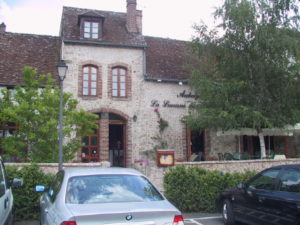
Leslie also showed a lot of wisdom with her sensitivity to her neighbors. She did not want the auberge to impose on the locals. Instead she wanted it to embrace them. Once she opened the auberge, she made sure that the locals knew they were always welcome. Soon the inn became the locals’ chic meeting place and whenever out-of-town visitors came, they felt as sense of pride of their village. The foreign visitor can quickly sense the bond auberge has with the town.
By 1999, the auberge was generating a profit. Leslie accomplished what she set out to do and showed the world that this movie star was for real as a restaurateur. Everyone noticed that there was a new and exciting vibe in the town and the effect went beyond the inn. The deteriorating town soon revived. Stores reopened, people moved back, and real estate values improved.
The Restaurant – A Really Good Restaurant
We sat at a table next to the ledge of the terrace just as the restaurant became busy with the weekday local lunch crowd arriving as well as with a few visitors who were staying at the inn.
“What would you like to have? Would you like the sweetbreads?” asked my host.
“That sounds good. Definitely the foie gras.”
“Okay. Have the foie gras, but you should probably have some fish after. Are you staying for dinner?”
“Yes.”
“Then have the sweetbreads for your dinner tonight. We’ll have the red mullet for lunch.”
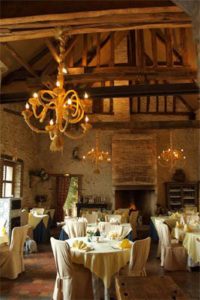 We spoke over a light lunch that started with small pastry hors d’oeuvres and a glass of champagne. Next for me was Chef Inagaki’s famous duck foie gras with spiced bread. Leslie had a salad of green asparagus, tomatoes, and parmesan shavings. The main course was grilled red mullet fillets. The lunch ended with fresh raspberry tarts.
We spoke over a light lunch that started with small pastry hors d’oeuvres and a glass of champagne. Next for me was Chef Inagaki’s famous duck foie gras with spiced bread. Leslie had a salad of green asparagus, tomatoes, and parmesan shavings. The main course was grilled red mullet fillets. The lunch ended with fresh raspberry tarts.
One key part of the initial struggle was finding a first-class chef who was dependable. Leslie went through a series of chefs who lacked either talent or commitment to the success of the restaurant. Finally she saw a small advertisement placed by a chef named Daisuke Inagaki. Daisuke, a Japanese native with a bachelor’s degree in political science, had been in France for several years pursuing his dream working as a gourmet chef. He received his culinary training in France. Then he worked at some of France’s most esteemed restaurants including Hotel de Cap in Cap d’Antibes on the Côte d’Azur (one Michelin star); L’Ousteau de Baumaniere les Baux de Provence and Côte Saint-Jacques à Joigny in Burgundy (both three-star restaurants). The last one was his own which also earned a star, Le Belvédère à Cholet in the Loire. His arrival at the auberge was a fit that Leslie was looking for. Daisuke is a capable chef who has the skill to make something exceptional when cooking simple dishes with local products. An additional perk was that Daisuke’s wife, Dominique, came with him and she became Leslie’s trusted manager at the auberge. With Leslie, Daisuke, and Dominique, the A-team was now in place and the auberge was off and running.
The big surprise of the restaurant is that it offers an excellent fine dining experience at a reasonably low price. To Leslie, this was a fundamental. The restaurant offers a prix fixe menu with a number of choices for the starters and entrees. Not including wine, the lunch menu is € 26 and the dinner menu is € 46. A supplemental charge is added to more expensive items on the menu. The wine list has wide selection with most from local wineries. Whites by the bottle range from € 20 to € 90, fifteen of which are available by the glass. Reds by the bottle range from € 20 to € 125, fourteen of which are available by the glass.
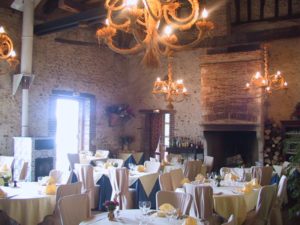
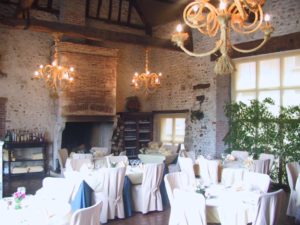
 In France, it is typical that many high end restaurants will offer a range of prix fixe menus with the lower and more affordable menu just barely passing for quality while the premier menu offers more attractive dishes at a more exclusive price. Leslie loathed this practice and decided that she wanted her restaurant to be inclusive to all her patrons without compromising the quality of the food. In just this one decision, she distinguished herself by being the first restaurateur in France to change this method.
In France, it is typical that many high end restaurants will offer a range of prix fixe menus with the lower and more affordable menu just barely passing for quality while the premier menu offers more attractive dishes at a more exclusive price. Leslie loathed this practice and decided that she wanted her restaurant to be inclusive to all her patrons without compromising the quality of the food. In just this one decision, she distinguished herself by being the first restaurateur in France to change this method.
The auberge is a captivating location for dinner at sunset. The sunlight glows into the restaurant through the large windows and gently onto the white tablecloths. You feel a tranquil sensation looking out at the view of the sun setting over the bridge and the slowly flowing river. My dinner was just as memorable as lunch despite the absence of the lovely Leslie. After another round of pastry hors d’oeuvres and a glass of Cremant de Bourgogne, I started with an interesting flavor combination of semi-cooked red tuna with wasabi sauce. I thought a bottle of the 2002 Faiveley Monthelie Côte de Beaune Vin Rouge would complement the unusual flavors I would be savoring. The main course was the much anticipated sautéed veal sweetbreads. The finale was a chocolate soufflé with a creamy pistachio sauce. A walk along the river is a nice way to walk off dinner.
The Rooms
While the main focus of the inn is the restaurant, it does have four comfortable rooms above the restaurant, all of which Leslie decorated and include antique furniture that she selected.
 The Loft – € 170 a night for two people, € 185 for three people
The Loft – € 170 a night for two people, € 185 for three people
The Suite – € 150 a night for two people, € 165 for three people
The Blue Room – € 99 a night
The Duplex with two rooms, one bath, private stairs – € 170 a night for two people, € 185 for three people.
In addition to the four rooms, The Residence, which is a hundred meters from the auberge, offers the comfort of a private house: three bedrooms, one bathroom, living room with fireplace, fully equipped kitchen and laundry facilities. € 850 weekly, € 2,500 monthly.
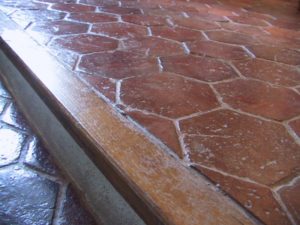 I slept soundly in my room. The next morning I went down to the breakfast room/bar. The auberge serves a very tasty continental breakfast of flaky pastries and croissants, freshly squeezed orange and café au lait. My only complaint was that the croissants were not bigger. They were so crispy and as good as any that I have had in France or Québec. After breakfast I ventured out to visit some of the sights in the surrounding area. Dominique was helpful with all my questions about getting around.
I slept soundly in my room. The next morning I went down to the breakfast room/bar. The auberge serves a very tasty continental breakfast of flaky pastries and croissants, freshly squeezed orange and café au lait. My only complaint was that the croissants were not bigger. They were so crispy and as good as any that I have had in France or Québec. After breakfast I ventured out to visit some of the sights in the surrounding area. Dominique was helpful with all my questions about getting around.
Exploring the Area
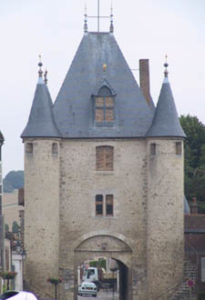 An extended visit to the auberge can be a good location for exploring the many other interesting places in this part of Burgundy. The staff can help you make arrangements to plan your itinerary.
An extended visit to the auberge can be a good location for exploring the many other interesting places in this part of Burgundy. The staff can help you make arrangements to plan your itinerary.
In the hands of Chef Inagaki, you will be off to a good start to a culinary tour of the area. But if you would like to venture out to other locations for additional experiences, the staff can steer you to some of the other outstanding restaurants in the area. For wine touring, Villeneuve is just to the northeast of the Burgundy wine regions. The closest is the Chablis district. It is possible to visit the small town of Chablis and the nearby famous Grand Cru vineyards. The staff can assist in scheduling wine tasting and visiting the vineyards of Chablis, Coulange, Irancy, and St. Bris le Vineux.
If you would like to see how the local dairies make cheese, you can visit a goat farm called Les Gauguing which is part of the village of Piffonds. They allow spectators to see the milking everyday at 7:00 am and at 7:00 pm. The farm is close to the A-6 highway near Exit 17 on the way to the auberge. They have 42 goats and a billy goat.
For those interested in cooking classes, there is a reputable cooking school ten minutes away. La Verenne is a château owned by the noted American cookbook author, Ann Willan. She organizes cooking classes while her husband takes guests to visit wineries.
Musée Colette. Forty minutes south of Villeneuve is the town of Saint-Sauveur-en-Puisaye, where one of France’s most celebrated writers was born. The Château de Saint-Sauveur-en-Puisaye, where the museum is located, is dedicated to presenting a replica of the world of the writer whose novels included Gigi. The museum houses a large collection of photographs, articles, and personal belongings including items from her Parisian apartment.
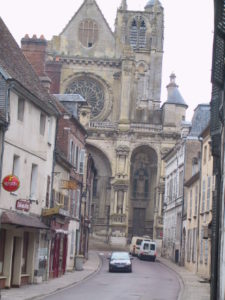
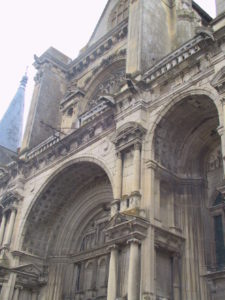
Château of Guédelon. Just a few minutes down the road from Saint-Sauveur-en-Puisaye, is the Guédelon castle project in Treigny which is the construction of a 13th century castle by trained artisans using building techniques and materials from that period. It is a unique attraction where visitors can observe the builders (even dressed in medieval costumes) at their work. For example, you will see the medieval pulley systems used to hoist the stone blocks and how the wood is formed for the vaulted roofs. The construction has been in progress for ten years and is expected to continue for another thirty years. If you go during rainy weather, dress down.
There are several historical châteaux to visit in the area. Among Leslie’s favorites are:
Château Ratilly-Treilly is a château she visits regularly. It has an austere 13th century fortress on the outside, but is flowery and charming in the courtyard. It also has stoneware pottery with interesting colors. Summer concerts are performed in the attics.
Château of St Fargeau is near the Guédelon castle project. It was built by Le Vau, the architect of Versailles. Every summer weekend extravagant re-enactments are performed of the famous memoirs of “La Grande Mademoiselle”, Anne Marie Louise d’Orléans, who was the Duchess of Montpensier and a cousin of Louis XIV.
Château de Tanlay is a 16th century château known for its beautiful setting. The property belonged to the family of the famous Huguenot leader, Admiral de Coligny François d’Andelot, during the Wars of Religion. It is also famous for its gallery in the trompe l’oeil style.
There are several villages to visit that make good day trips.
Noyers-sur-Serein is one of the oldest villages in France and is famous for its steep tiled roofs and beautiful half timbered and arcaded houses.
St. Julien-du-Sault. Just down the road from Villeneuve. The crusaders built a magnificent church there with memorable stain glass windows. The medieval village is enchanting.
Auxerre is imposing with a rich and powerful history. The monuments must be seen.
Sens boasts of the oldest gothic cathedral. The archbishop palace houses a museum and the covered market is a favorite of Leslie.
Flavigny-sur-Ozerain. The medieval village of is famed for its production of sweets called “anis de Flavigny” (aniseed balls) and the film Chocolat was filmed here.
Other attractions near the auberge:
You can hire a little barge for the day (from Auxerre) and go up the canals of Burgundy as well as the Yonne River. There is a riding school close by. The auberge staff will help arrange horse riding.
Across the bridge from the auberge and to the left is a rustic but supervised free beach with sand on the river.
A Welcoming Host
Madame Caron has traveled a long way since she first open the auberge. She transformed a town in decline. Her clientele has grown internationally consisting mainly of French, British, Americans, Canadians, Germans, Australians, and Belgians. And it is a profitable business – in fact, people do not just think of her as a celebrity was owns an auberge; they consider her a successful business woman. While she is delightfully amused with what she’s accomplished, she takes none of it for granted. She knows that it took a tremendous amount of work to get the auberge to this point, but she is keenly aware that it is an ongoing challenge. It is her main occupation today. At least one day each week, she is there attending to whatever issues must be dealt with or to just touch base with her staff. If you happen to be there on the same day when she is there, she always enjoys visiting with her guests.
She has a special place in her heart for American visitors because she is half American herself (her mother, Margaret Petit, was born in Seattle, Washington) and the U.S. was an important part of her career. But she understands the reasons why some Americans prefer not to travel to France at the moment. The disagreements between the countries on international issues, the declining value of the dollar against the euro, and competition from other European destinations like Italy and Spain. Nevertheless, she is patient that someday they may want to give France a chance again. And when they do, it will be her and her staff’s pleasure to greet them.
A visit to the auberge, whether brief or extended, is an encounter with Leslie’s latest and longest running performance. Her hospitality is an expression from her heart to warmly welcome all her guests and see that they have an authentic and memorable experience. It is a show deserving of a standing ovation. Bravo, Leslie Caron!
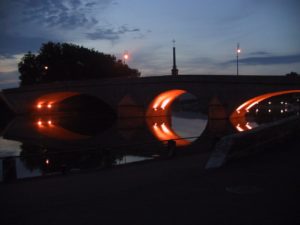
***********
An Interview with Leslie Caron
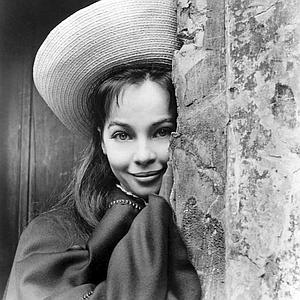
There are so many things that can be said about Leslie Claire Margaret Caron. She’s seen it all. She’s done it all. A unique and talented beauty. In all of her performances, she could masterfully change her emotions and make her audience feel what her character was feeling. In one moment she could be a woman in charge with no time for any nonsense, the next playfully joyful, and then a show of heartbreaking vulnerability.
Her light step in all of her dance numbers. Star ballerina before the age of twenty with Les Ballet des Champs-Élysées under the direction of Roland Petit. It was during one of these performances that Gene Kelly saw her dance and wanted her to be in An American in Paris, which was her debut film. Danced and sang to the music of George Gershwin, Lerner and Loewe, and Rodgers and Hart. Partnered with both Gene Kelly and Fred Astaire. Danced on stage with both Rudolph Nureyev and Mikhael Baryshnikov in the same production.
Acted with many of cinema’s legends. Cary Grant, Henry Fonda, Maurice Chevalier, Louis Jourdan, Charles Boyer, Orson Welles, Alain Delon, Mel Ferrer, Nino Manfredi, and Anthony Hopkins, among others. Worked with legendary directors Vincent Minnelli, Nanni Loy, Jean Renoir, Peter Hall, Ken Russell, James Ivory. Critical acclaim for her roles in Lili and The L-Shaped Room which included two Academy Award nominations. Stunning performances in lesser known productions such as in Il Padre di Famiglia, Carola, QB VII, and Funny Bones.
In short, she is an image of some of the most culturally important films in movie history.
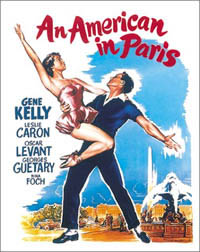 Has always stayed busy with various character roles or cameos in recent years such as in Damage, Chocolat, and Le Divorce. Her last acting appearance was in 2006 on Law & Order: Special Victims Unit for which she was awarded last month with an Emmy for Outstanding Guest Actress in a Drama Series.
Has always stayed busy with various character roles or cameos in recent years such as in Damage, Chocolat, and Le Divorce. Her last acting appearance was in 2006 on Law & Order: Special Victims Unit for which she was awarded last month with an Emmy for Outstanding Guest Actress in a Drama Series.
But the role that has been her primary concern for these last two decades has been as restaurateur/innkeeper of the Auberge La Lucarne aux Chouettes. It is a part she executes with the same integrity she has given her characters in film, theater, and television. She is also currently working on her autobiography which is certain to be an intriguing read about this distinguished woman.
I met with Leslie at her auberge on June 13, 2007, where we ate lunch and had the following discussion.
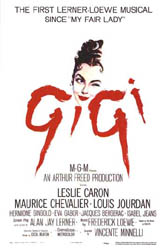
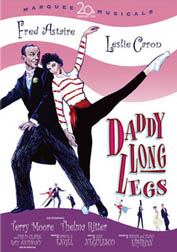
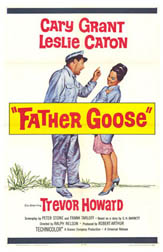
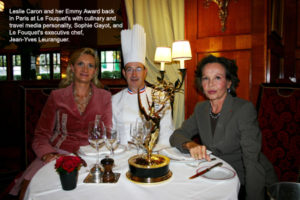
JP: When did you first hear of Villeneuve-sur-l’Yonne?
LC: The director Jean Renoir was a close friend of mine, and he told me about it.
JP: There are several other beautiful towns within the same proximity to Paris. Why build an auberge here in Villeneuve? Why not Loire Valley? Brittany?
LC: Well, I had my millhouse here. My son and I bought these first buildings on a lark. Then it became a challenge. We had it sitting from 1987 to 1991. We had it sitting there. We owned it and it was just sitting there. I was engaged into trying to turn it into a weekend place for a bunch of friends or afterwards having a festival on the water which would have been grand. Then I went to see the authorities. I put together a whole program and I could never interest them which is a pity because I remember when Avignon started with just one little show on the terrace of the palace and just look at it now. It’s the biggest festival in the world. I had it all it all set up. I had the play. I had the plans. I had the hall. I had the singers. I had the design. But they didn’t trust me.
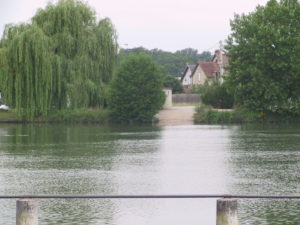 JP: After the success you’ve had now would you like to make another attempt bringing a theater festival to Villeneuve?
JP: After the success you’ve had now would you like to make another attempt bringing a theater festival to Villeneuve?
LC: No, it takes an awful lot of strength.
JP: Do you still own the millhouse?
LC: No, I sold it to help finance this project.
JP: You oversaw much of the construction and decorated the auberge. You seem to have a deep knowledge of construction. Where did you acquire all this knowledge?
LC: My grandparents built a lot.
JP: Was that their occupation?
LC: No. No. They were wealthy and they built various structures because they enjoyed it. Watching them build and over the years, I just absorbed a lot.
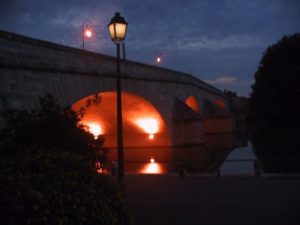 JP: From the time you decided to do this project to the day you opened the doors, how much time did that take?
JP: From the time you decided to do this project to the day you opened the doors, how much time did that take?
LC: Eighteen months.
JP: Was the grand opening just the opening of the restaurant or for the hotel as well?
LC: I think we opened on the 19th of June. I have a feeling I got my Legion of Honor on the 13th and I was sort of annoyed because this really got in the way (Laughs). I should be polite about it, but I didn’t have time to get clothes and my head was all in this. President Mitterand, who gave me the Legion of Honor, didn’t think it was proper to mention this in my biography. To me this was the most important thing I had ever done. And if I could succeed I thought I’m really accomplishing something. I thought this was so much more of an achievement than being a movie star where you do as you are told. I’m exaggerating, but there was a bit of that. Anyway, we opened on the 19th. The rooms were not finished so I stayed on the spot another month. I think the rooms were opened in July.
JP: Was the first meal lunch or dinner?
LC: Dinner. The first night was for everyone who had worked on the auberge. I didn’t take any customers so all the workers and their families came and the place was filled with people. It was really a very joyous evening. And the look on the faces of people in the village. They were all sitting on that bar there along the river staring at us. It was very strange. It was the show of the week.
A few months before opening, when I still had some boards lying around, the bags of cement, and the bags of plaster, nothing was ever stolen. There was plenty lying around that could have been stolen and absolutely never was. It was amazing. Some people came and got a little bit of sand for their cat. That’s it, but that was very sweet. The town was behind me. On one weekend, some kids wrote on some old garage door against the wall there in French, “Salut, Leslie! When are you opening?” (Laughs)
JP: I read that the locals boycotted the inn for a while in the beginning.
LC: They really didn’t boycott. They were just shy.
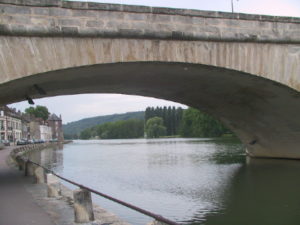
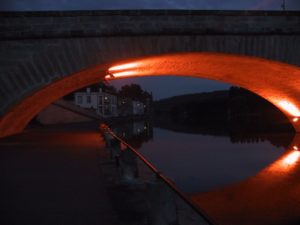
JP: But there was no hostility towards the auberge, was there?
LC: They were amazed. Skeptical, but pretty impressed. They could see that the building was reviving. They could see there were doors and windows coming in. The walls had been cleaned.
JP: It doesn’t appear to impose on them.
LC: No. This was here and finally little by little it became their meeting place. Their glamorous place. Their place where it’s pleasant to be. It’s improved local business considerably. All sorts of other shops started. Suddenly two hat shops. Suddenly from having no real estate dealers at all, now there are four real estate dealers. There’s more food shops, more clothes shops. Everything has enormously improved since we’ve been here. Then there’s one of the best chocolate shops in France – I would say in the world. They had closed down, but then they came back.
JP: Because of you.
LC: Well, I think so. In a way. The town has revived. I see the price of real estate has boomed and there’s many more cars. This parking lot used to be empty. Every time I come there’s more cars and I think, “What is today? Why are there so many cars?” Look over there. Now cars are lining the water there. They never used to do that except on market morning. This village was dying. Little by little, people deserted, businesses closed down, and real estate was given away.
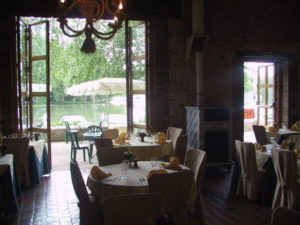
JP: Was that what was going on with the owners of this property when you bought it?
LC: Yes. I bought one of the houses for I think for 20,000 francs in 1990. I was offered that whole rest of the street there for 80,000 francs.
JP: It was all abandoned?
LC: Yes. I would have bought all of it except I thought there is a limit to what I could do. The town bought the rest of them and made a ballet school and a library.
JP: You must be pleased that there is a ballet school here.
LC: Well, the odd thing is that they never asked me to give my opinion about it. It never occurred to them. (laughs)
JP: That’s sad. I mean, come on.
LC: It’s bizarre. But the revival of the town is a great thrill for me and I know it’s because of the auberge. This spot at night was a dangerous place to be and people used to abandon their old cars here. Just leave them here. As a matter of fact when we started to build, there was one left right there and we couldn’t find out whose it was. The town hall wasn’t doing anything about it. So I said to the builders let’s undo the brake and move it a little closer to the river. Then we’ll call the town hall and say, “Listen, people, it’s slipping into the river. Do you want to come and collect it?” (laughs)
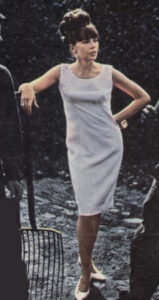 JP: What is in your background that you were able to come up with a conniving idea like that?
JP: What is in your background that you were able to come up with a conniving idea like that?
LC: I know. I’m a bit of a gangster. Anyway, we got rid of that. But that’s what it was like around here.
JP: When you say dangerous, what do you mean?
LC: Thieving.
JP: Anything beyond that?
LC: Well, it isn’t a dangerous town, but this was a place where you would never see a woman walking alone at night. There were no lanterns. It was dark and filthy.
JP: You’re more than just an innkeeper. You’re a community developer.
LC: Yeah, I did that. Then the beauty of the bridge is really put into its full value here.
JP: Was the bridge restored or was it like this when you came here?
LC: No, it’s been restored and been lit up. You’ll see tonight. I would be delighted to be here everyday of the week because it’s simply beautiful. It’s magic.
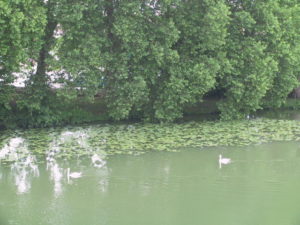
JP: Why did you name the auberge La Lucarne aux Chouettes (The Owl’s Nest)?
LC: I didn’t name it. Warehouses had names, not numbers, in the town. The first house which is now the entrance and the duplex was registered in the town hall as La Lucarne aux Chouettes.
JP: I like that. An appreciation for history.
LC: Exactly, so I kept it.
JP: You’ve said before that you were nervous on opening night and you’ve said that there were problems with the chef. After those beginning days, how did you feel afterwards? Overwhelmed or a feeling that you could get the hang of it?
LC: It took me years and years.
JP: So the first few years were you waking up with the feeling of why you decided to do this?
LC: Yes, thinking I don’t want to wake up. Then I found those two wonderful people. By then, the place was considerably in the red. Although in the summers, I used to make up for the deficit. Each year we made a little more no matter what. No matter how difficult and incompetent the first chefs were, we kept making more money.
JP: Was the occupancy full throughout the summer months?
LC: Yes. Then about eight years ago, I started being able to repay the partners for their investment. By now, we have completely repaid the bank and we are now repaying ourselves. There are two companies. The stone and the exploitation of the building. The exploitation has been entirely reimbursed. Now we are starting to reimburse the partners on buying the building. It’s a wonderful feeling.
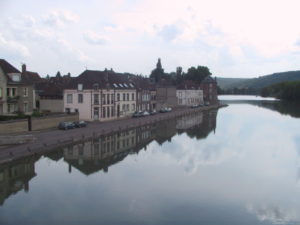
JP: You said you started making a profit in 1999. Did you think it was just a matter of time or did you have to make certain adjustments since you opened in 1993?
LC: When I hired Daisuke Inagaki to be the chef, things got better. The first three years were difficult. I had problems with several chefs. The first one was chosen by a large consulting firm which I really didn’t want to go along with, but I thought I would try it. He was a disaster. Then the next one had a drinking problem. The next one was a woman who was at first an assistant chef. She was good and I was happy to give a woman chef an opportunity, but after a while she was not happy because she felt it was difficult for a woman to be respected as the chef in a restaurant which is typically a man’s environment. Luckily around that time, I saw a small ad that Chef Inagaki placed. It was a modest ad and I was attracted to that. Also seeing that he was Japanese I was interested in that too. I always thought it would be wonderful to have a Japanese chef but most of them have difficulties getting their French papers. But he had been here for a while and had worked at a few very good restaurants in France including some Michelin star restaurants. He also had his own restaurant before coming here. Another benefit is that his French wife, Dominique, came with him and she manages the auberge. They have been wonderful. Things went well once I got them on board.
JP: You’ve said that you had to believe in the success of this place. Were there many doubters around you?
LC: Yes. Close friends and even my son. He said, “Would you please sell?” When I took the license to build, the local official said, “Don’t do this.” (laughs) One of my best girlfriends said, “Leslie, don’t get into that. Sell.” Et cetera. Everybody kept telling me to sell.
JP: It must be a wonderful feeling to see their reactions now.
LC: They’re impressed. One of the three partners is a friend of my son who is a banker and he had so little belief in me, he really mistrusted me. He can’t believe it. (laughs)
JP: Why did you believe in it?
LC: I had a simple theory. I thought the place is absolutely beautiful. If the food is good, the price is right, the place is beautiful, we cannot fail. It’s as simple as that.
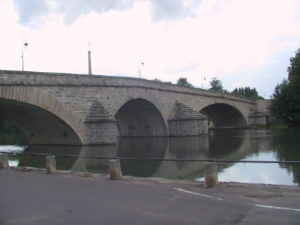

JP: I want to mention two quotes of yours. “Americans only come here because it’s Leslie Caron.” And you also said that Burgundy still hasn’t opened up to tourism. Coming to the auberge because of you, to me, that’s reason enough. But do really feel that way with all of the things to do when visiting Burgundy?
LC: Yes. I may have said that ten years ago when it certainly was true. This place had no tourism at all.
JP: I didn’t realize that the barge cruises came through here.
LC: The barges were very present very early in the year.
JP: Were you coming here before the barges started coming through?
LC: No, at about the same time. I would say about the late 1980s. They were doing very well and then I would say the Iraq war stopped everything. And also we must mention the Euro becoming so powerful. That really hurt. That was quite disastrous and bankers have told me that it’s here to stay.
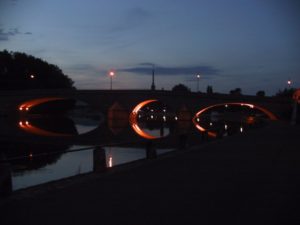
JP: Who is your clientele today?
LC: Well, there I think I was pretty smart because I said I want this to be democratic. Especially if you start in a place in the country, you’ve got to think about who your clientele is. So all right, I had American and English tourists. But mostly during the whole winter I had to rely on locals. Also I’m a rather democratic person and I don’t want people to see a menu at €300 and a little menu at €55, and a menu at €120, et cetera. People bring guests and they feel uncomfortable. So I said everybody is the same. One price and then there would be a choice of courses. So nobody would feel like they are being indiscreet if they take a higher priced item, and the person who pays the bill will not feel embarrassed. That didn’t exist in the provinces. I’m the first one to do that. Only one price. Then there came the moment when we had to put supplements on certain things, but that’s okay.
JP: Explain how prix fixe menus are usually offered in France.
LC: In France throughout it is a sort of social strata thing which is quite nasty. You have a menu at €55 and one at €120. At €55 it’s really tins and very ordinary cooking, et cetera and I find that very ungracious. I’m all for shredded carrots, but everything must be at the same price. You take the shredded carrots if you feel like it, but you can also have shrimps or whatever.
JP: Equal access for everyone.
LC: Yes. Exactly. That was a huge success immediately. People felt very comfortable here. The idea of comfort is what I prefer for them. I’m very aware of the comfort with the sounds. I put cloths on the chairs and cloths up above so that there is no resonance. It’s comfortable to be here. Comfort of balance of materials and color so that you really feel good when you are here without knowing why they feel good. But I know why. I’ve studied it.
JP: As you are saying all this, I’m wondering what is your background that you know how to make these strategic business decisions?
LC: It’s just a natural born interest. I’m always concerned that people should feel comfortable so I think why do they feel uncomfortable about something. It’s either because the proportions are not correct. Proportions of windows. Proportions of rooms. Height of the ceilings. All that makes a very great difference in the feeling inside a room. Why are the shadows that come into the restaurant very comfortable? Because the windows start on the floor and they’re three meters high. Ahhhh. And the ceiling is high. Why are those terrible apartment houses so uncomfortable because the window is small and you feel like you are in a box. I think so much about all that.
Otherwise, it could be a matter of the balance of materials. You have stone visible, but then I have red bricks which are very strong and old so they are comfortable. And there is wood and the balance is good between the old wood, the old tile floors, and the stone. Otherwise it might have been harsh. When we had a cement floor before putting down the tiles, my third partner came and he said, “Leslie, this is terrible. You’ve got to put plastic and pink.” I really was depressed. I thought, “I think I know what to do. I’m very, very nervous about this.” As soon as the floor was put in, I said to him, “Wait until the red tiles are put down and wait until the chimney is done with the warm red brick, you’ll see. All of it will be right.”
As the terrace was being built, it seemed a bit harsh and cold. There was something missing. Then I realized what it was. Trees!
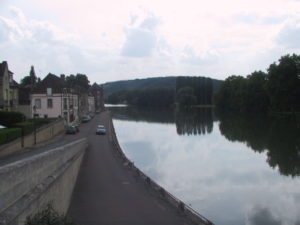
JP: When I arrived a little while ago and entered the dining room, I didn’t expect the high ceiling. I expected something fairly low and dark. There’s an openness to it.
LC: And you see I didn’t want great big sliding glass doors. I always think you have to frame your divisions. It’s important to have an expression of the old window with the wood frames. I know sliding doors are uncomfortable. So all that was taken into consideration to make it comfortable.
JP: Your clientele are from which countries? French, American, and English mostly? Italians maybe?
LC: I also have Australians now.
JP: I saw the testimonial on your web site by an Australian.
LC: Yes! A lot of English. Lots of Americans. Italians? Very few. I don’t think they have a reason to stop here. We have had some Germans and some Belgians. And, of course, the locals. For the locals, my first thought was businessmen at lunch. I’m going to have a low cost, good food, simple and fast lunch. In those days, it was under 100 francs. Three courses, no cheese. Just bang, bang, bang. They can get out and get back to work. That attracted an awful lot and they came back for dinner with their wives. It was a promotional item that worked very well. Then there are an awful lot of vineyard landowners who come after the harvests and eat at big tables. I have weddings, first holy communions, birthdays, anniversaries.
JP: Weddings can be a real worry for the planner, can’t they? I’ve seen that with Americans who want to get married in Tuscany which adds to the disaster.
LC: I’ve had that and it’s been very difficult. I had one wedding where they got married in the town hall and the mayor couldn’t figure out why they wanted to get married here. I tried to say, “Well, I’m quite popular in America.” He still didn’t get it. Nevertheless it was a success and they were thrilled. Also I left leaflets with the great hotels in Paris with the concierge. One concierge came quite regularly himself. I don’t know if he sent me guests, but he became a customer. And little by little, Americans who live in Paris come. I’ve linked up with American groups in Paris and they come by bus loads.
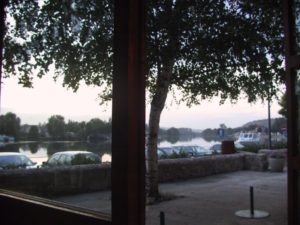
JP: Do they come here just to eat or to also spend the night?
LC: Just to eat and do a tour around the area.
JP: So a large part of your restaurant clientele is not necessarily people who spend the night.
LC: No. Much more for the restaurant because we only have four rooms.
JP: Would you describe the auberge more as a restaurant that happens to have a few rooms or as a hotel that also has a restaurant?
LC: As a restaurant with a few rooms.
JP: You are open year-round?
LC: Yes, we take a whole month off as of this year. Last year, the government forced us to give – I can’t believe it – I think it’s seven weeks of paid holiday.
JP: Paid holiday? Oh my.
LC: So for seven weeks you don’t make anything.
JP: Plus you have to pay everybody. When is will the seven-week period be?
LC: We close down in all of January and a few days here and there. I think as of this year with the new president, we may be able to give only six weeks.
JP: So you close on January 1 . . .
LC: No, we are opened on January 1. We close on January 2. We do quite well at Christmas. We open back up on February 1.
JP: Do most people arrive by car?
LC: Yes, and I do advise it because there’s so much to visit with a car.
JP: It sounds to me that the locals have adjusted to the addition of the auberge.
LC: Oh, very much so. They support us. We are their favorite place. Yes. It works very well with them. Some even order take away. This foie gras is quite famous. They come and order foie gras. Definitely at Christmas, we just sell it away like this in jars to a lot of people. Daisuke is very good at this. Sometimes he does little cocktail food take away.
JP: How much time do you have available to come to the inn?
LC: I come when I’m needed. Today I brought in the CD player. The old one was not working anymore. So I combine a trip with talking with you and bringing the CD player, et cetera. Last week I was here redoing the plate wardrobe. Did you see the beautiful plates in the entrance?
JP: Yes.
LC: It’s an absolute wealth of a museum. Most of them are English. I relined the wardrobe and it took all day to do that. So I came last week to do that.
JP: So how often are you here?
LC: At least once a week. I do planting. I do the accounting and I have to meet with the accountants. There are always extra things to be done. This is why it’s so useful because Daisuke is perfect in the kitchen and Dominique is perfect in the front. But I’m useful at for instance saying something suddenly like I think our insurance is going too high. Let’s ask for competitive insurance bids. Let’s write a letter. They put five percent every year on things that diminish in value. So you have to check and watch and control all of that.
JP: If you weren’t such a great actress and dancer, I would have said you missed your calling in life. You seem to have a knack for business.
LC: (laughs) I guess. I guess. I don’t know. Maybe. Maybe.
JP: Just listening to you it sounds like you have an instinct for this.
LC: I have an instinct for running a house.
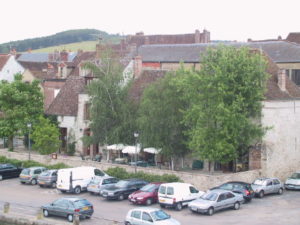
JP: Some of your guests come here hoping to get a glimpse of you.
LC: Yes, and a lot of them often do.
JP: I’m sure you are gracious to say hello . . .
LC: Oh, yes. It’s fun. I really enjoy it. And it’s fun to see what sometimes happens among the guests. Last week when I was here there were two groups of Americans and they sort of met over coffee at the end of their meal. “Where are you from?” “California.” “Us too.” “Where from in California?” “Northern California.” “Us too.” “Which town?” And they were ten kilometers away from each other.
JP: I like stories like that.
LC: Yeah! Not so long along it was Australians. I was having lunch with some Australians – The Brisbane News. There was another table of Australians who are building a home here. People come here and they just find it so beautiful and they look around at real estates dealers and buy.
JP: Have you’ve been awarded with the key to the city yet for all you’ve done.
LC: (laughs) No.
JP: You should. I’d like to talk a bit about food.
LC: Yes.
JP: How are the menus and wines selected? Are you involved with that?
LC: Very little. That’s very much Daisake’s area. He’s very capable, very inventive, and very conscientious in keeping up the quality. Absolutely passionate about cooking. So in between meals he’s sitting there by the window reading cookbooks. (laughs) And then, when I go to good restaurants, I come back and I tell him, “Listen, I ate something. We really should do it.” And I tell him how it’s done and how it tastes and the size and so on. And so we put it on the menu.
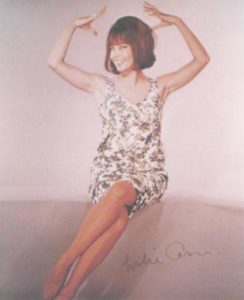
JP: For people who stay here a few days, I would think that typically they will have their first meal here at the auberge. But should they be interested in having a variety of dining experiences, are there other options?
LC: Yes, there are several very good restaurants in the area.
JP: Do you find that dining experiences tend to be more memorable in relaxed setting such as this as opposed to a place like Paris?
LC: No, I don’t think so. It all depends on who you are with. Your friends, your group, the circumstances. To me, there comes a point where the food is very good, and beyond that what matters is the decor.
JP: The reason I ask that question is because it seems to me in settings like this as opposed to restaurants in large cities. The ones in large cities are under more pressure to redefine themselves and those in tranquil places can focus on what they want to do at heart.
LC: Yes and no. There are some great, great restaurants in Paris where they practice quiet discretion, space, and all the things that make an evening really enjoyable. But there are an awful lot of restaurants in Paris – you are right – that are noisy, crowded, and sometimes ugly. That really is wearing. It tires me. Of course, the beautiful qualities of looking at water flowing like here is extremely soothing.
Speaking of this river, I’m the one who asked the town to build this edge along the river. There was a motion with the town asking all citizens who wanted to offer a design for the water’s edge and I’m the only one who bothered. I got myself a five-meter measuring line. I made a plan which I gave to the town hall. I thought something was needed for the townspeople. I could see them on Sunday walking with their babies and grandmas, and so on, along the river. I said that you’ve got to have a path kept up for them and separated so that the cars can’t get on it and people can keep walking. It’s so pleasant for the townspeople. I also wanted these hedges of bushes here in the parking lot so that when people backed in with their cars, the hedges stopped all the fumes from coming this way.
JP: Good grief. You’re just – you keep surprising me with the things you keep coming up with. What I like about the bushes is that – you know how parking lot can look so ugly – you have many cars parked here but it’s not so disturbing.
LC: You don’t notice because of the hedges.
JP: Is it possible for people who come and stay here to arrange food-related sightseeing, for instance watching the process in a bakery or a dairy?
LC: Ah, a bakery. No, I haven’t done that, but there is a very famous cooking school close by called La Varenne. It’s an American, Ann Willan, who has it. She has very famous cookbooks. She and her husband have bought a château about ten minutes from here by car and she takes people in for cooking courses and he takes them to visit vineyards. She also brings them here. We organized things for people who want to do things like that. We can organize a private barge to go out for the day. We can organize horseback riding. There is a riding school nearby. I think we can also organize bicycle rentals. There is a goat farm where people can go see cheese being made.
And now we have this swimming beach on the other side of the river that you can see from here. There are plenty of photographs of this on my web site because it opened last and I was so thrilled. The town tests the water every week and cleans up the beach.
JP: I have a question about your hospitality philosophy. Here’s a quote of yours. I’m paraphrasing: “Everything we do here is based simple authentic things. Honestly, quality, something done with soul.” I agree with you. I like the concept simple elegance.
LC: Yes! That’s it!
JP: What is it that is so preferable about simplicity?
LC: In general, simplicity is achieved with natural elements. It’s the difference between tacky and elegance. With tacky, you only have a little slice of something. Elegance you have the whole piece. Things are real. They are not imitation. When you have utter simplicity, you have real linens, real cotton, real wood. I respect things that are handmade. Yes, you will have handmade tiles on the floor of your little bath area of the room you are staying in. You will see three ridges on it which are fingers. When the work was finished, the workman dragged three fingers over it. And the charm to me of this brings a human element to human testimony of something. And it’s the signature of the workman which I respect. I have plenty of tiles inside that have chicken foot marks or baby shoe prints and I said,
“Leave it! Leave it!”
JP: Has it been difficult to balance your time with the auberge and your acting demands?
LC: No. No. Not at all. I delegate. The funny part was when I was filming Damage and constructing here. I was staying at the Dorchester Hotel in London. I had to clean up my nails for a long time because I playing a lady. I was on the phone to my British builders saying, “Listen, I really think those pillars must be in brick and not in wood. But don’t make them larger than a brick and a half. I swear to you it will be strong enough to withstand the ceiling. I know it will.” (laughs)
JP: You’re in the middle of a multi-million dollar Hollywood production and that’s on your mind?
LC: Yes. Yes. And I was dealing with pillars in the back of the kitchen there. The British make things a little too stocky.
JP: While you’re on the set, you’re having this telephone with the builders?
LC: Yes.
JP: What were the director, producers, costars, Jeremy Irons, and everybody else thinking?
LC: It was okay. There was time to do both. The funny thing is when I signed the contract I said to Louis Malle’s brother who was a producer, “Now you’ve got to pay me carefully on the date because I have responsibilities. I’m building a hotel.” “Oh? where?” “Well, ‘em a little town in Burgundy.” “Oh? Which town?” “Oh, Vincent, you wouldn’t know it. It’s called Villeneuve-sur-l’Yonne.” “Which side of the bridge are you?” I said, “What!” “You know that tower on the other side of the bridge? I spent my childhood holidays in there.”
JP: Louis Malle’s brother holidayed here.
LC: And also Louis himself. It’s a small world.
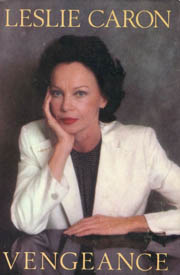 JP: I want to move on to some other subjects. You wrote a book in 1982 called Vengeance.
JP: I want to move on to some other subjects. You wrote a book in 1982 called Vengeance.
LC: Yes, short stories.
JP: Do you see yourself returning to writing?
LC: I’m writing right now. I’m writing my bio. There you go.
JP: Well. You knew that was my next question.
LC: I’m on page 110.
JP: Do you have a publisher yet?
LC: No.
JP: I don’t think that will be problem.
LC: I don’t know. I have three people proposing to be my agents, but I don’t know which one I’ll take. But I have the structure and I’m up to 110 pages.
JP: I’m sure you have a lot to share that we all will look forward to. I was surprised that there are not even any unauthorized biographies out there on you. If you don’t mind, I’d like to talk you about your other day job, the one you’ve been doing a bit longer.
LC: All right.
JP: An American in Paris. What a movie to start your film career.
LC: I know. I’m so impressed now. (laughs) At the time, I didn’t even know who Gene Kelly was. In France after the war, Gene Kelly was totally unknown.
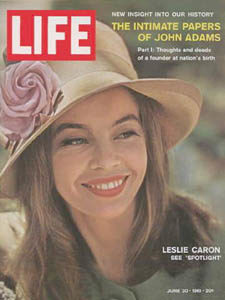 JP: Fred Astaire said that you held up production during the filming of Daddy Long Legs because you wanted to make sure that you had a particular dance step down. He said that he respected your professionalism.
JP: Fred Astaire said that you held up production during the filming of Daddy Long Legs because you wanted to make sure that you had a particular dance step down. He said that he respected your professionalism.
LC: (laughs) I suspect this story is not true. The true story is quite the reverse. Fred was supposed to do a number on a breakfast table on wheels. It was really an extremely difficult thing to do. He had to push himself on the table, spin, stop in front of the elevator, and there’s a lady who can’t believe what she sees. He did it in one take! So the first assistant rushed to the rehearsal hall where I was working with Roland Petit and said, “Leslie, quick, quick. Get to makeup and hair. There is nothing more to shoot. Fred has done it in one take, instead of one day. So get going.” I said, “What! What do we shoot? I don’t know any numbers.” He said, “Fred says you don’t need to learn this one.” And I said okay. So I went to hairdressing, makeup, and I turned up on the set. Fred said, “Oh, I can lead you through this one.” And he did. We filmed it and I never learned this.
JP: He led you through the whole thing without mistakes.
LC: Yep.
JP: Well, I heard he could dance a little.
LC: He was pretty good. (laughs) But I’m not so sure I held up things on that film. I know there’s another film where I was supposed to improvise a number and I said, “Give me half a day, I don’t want to mess it up.” That was the film with Rock Hudson, A Very Special Favor. I held up production for about one or two hours to do something because I didn’t want to just get into nonsense.
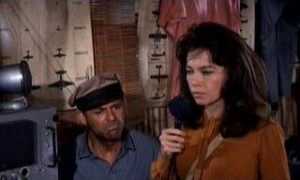 JP: Father Goose is probably the movie that is shown on television more often than your other films.
JP: Father Goose is probably the movie that is shown on television more often than your other films.
LC: That was terrific fun. Terrific working with Cary Grant. Terrific. You were working with the very top.
JP: He was famous for kidding around on the set, right?
LC: Well, Cary was a devil because to him a scene was good if it broke up everybody and he really worked at breaking you up and there is one shot I did with his back to me because he was so wicked. It was the scene where I was drunk. I had to do the close ups with him turning his back to me. Otherwise, he’d make me laugh.
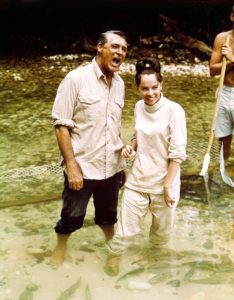
JP: Your classical dance training is well known, but where did you develop your acting skills?
LC: I took lessons from a very great teacher in Hollywood he was straight from the Stanislovsky school, George Donoff. He was a well known coach. He trained well known actors.
JP: I read that your favorite film was Il Padre di Famiglia (The Head of the Family)?
LC: Yeah, I’m pretty good in that one.
JP: Are you fluent in Italian?
LC: No, in those days I couldn’t speak at all. It was very difficult and I think in a way it almost helped the film because it was so difficult to know where I was in the script and understand my partner, Nino Manfredi. I had this intense concentration. What’s he saying? When is it my line? And I adored the way they filmed it. It was so wonderfully done. I know the set was reproduced by the director Nanni Loy. He reproduced his own apartment. He even brought the real doors from his apartment. This was his autobiography. It was fascinating playing with children, always four to six actors in a room and the cameras everywhere. You just didn’t feel you were filming. You were in life. Living life.
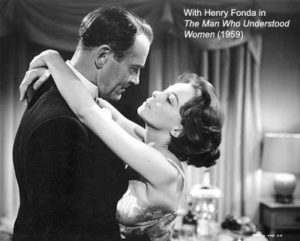
JP: It must have been quite an experience working with two great Italian actors at the same time, Nino Manfredi and Ugo Tognazzi. Did either one of them speak French or English?
LC: No. Wait. Tognazzi spoke French. But we started the film with Toto and he died. After doing several scenes, we had to refilm them with Tognazzi. That film was prized everywhere. I was supposed to get the Venice film festival best actress prize, only I had been obstreperous in Moscow and so the Russian delegate put a veto on me. But this is really a very good film. It’s a film that has not had the career that it should have because the producer was simply a rich peasant who didn’t know how and who to contact to market it. He had no experience so the film didn’t get the attention. I know it got a prize in Rome for Nanni and for the film itself. Nanni was a renowned teacher at the experimental school of cinema and he was just wonderful.
JP: Explain to me what the Russian delegate did.
LC: I was a member of the jury for the Moscow film festival. They thought she’s a woman easy to manipulate and she’s played in this film Lili where she was a poor downtrodden little orphan. She’s just want we need to represent America. It shows America as being this very depleted country. As a matter of fact, the American official film was Up the Down Staircase which shows all sorts of corruption in schools and conflicting situations in schools. Very dramatic. A bad image for America. That’s what they wanted. Okay.
They wanted the Russian film, Zhurnalist, to win the golden prize. The Russian film was totally indigestible, awkward, badly done and just mush. Whereas the Hungarian film, Apa, by the director István Szabó was remarkable. I, on my white horse, said we must be an honest jury and vote for the best film. I said I would not give my vote to the Russia film which I think is turgid. (laughs) But I think the Hungarian film is very good. Now Hungary was just a satellite country and it wasn’t allowed to win anything so I got into really hot water. I also did something else . . . anyway, I was not liked in Russia after that.
So the Venice film festival was led by a director who was a communist, I can’t remember his name, but he was one of those Italians, intellectual left wing which means he had plenty of money, a very good salary, lived very well. All of the upper class in Italy were always so-called communists with fat salaries and money in Switzerland and everything else. So he was squeezed by the Russian delegate who said if Leslie Caron wins the best actress prize for Il Padre di Famiglia, he’d walked out and create a scandal. He put some pressure on the director so I didn’t win. It cost me to be honest. I don’t know if István Szabó was grateful. His film was remarkable about a young man who becomes an adult who is in conflict with his father.
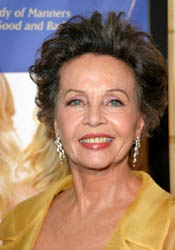
JP: Do you still attend film festivals?
LC: Yes, but I have really done the rounds by now. I’ve done the circuit. I’ve been in Cannes, Moscow, Venice, Berlin, Toronto, San Sabastian. I’ve been a jury member.
JP: What is your opinion of movies in general today?
LC: I think they are fantastic. Of course, I’m not interested surrealistic and action films. And yet, I think the films today are very sophisticated. I think the acting is superb.
JP: What about the writing?
LC: Superb. Absolutely superb.
JP: Are you thinking of particular examples?
LC: Yes. I think, for instance, Brokeback Mountain is staggering in terms of its theme, execution, acting, photography, everything. I think Woody Allen does the best murder movies. I think Match Point was so sophisticated, wonderful. That’s what I love best is murder mysteries with upper class people who are real villains. Well known citizens who have committed murders. He’s absolute tops at that. Manhattan Murder Mystery was fantastic. Crimes and Misdemeanors. I love all kinds of American films. What was the one about the horse? What was it?
JP: Seabiscuit!
LC: Yes!
JP: Great movie. Great story.
LC: Oh, I adored that film. I even voted for that knowing it wouldn’t win, but never mine. Ah, I saw it three times. I just loved that film. Ah, what a dear, dear film. It’s what Americans do best that’s fabulous. This sense of we can win, we can get it. I think that’s absolutely wonderful.
I adored the film where Meryl Streep plays the country singer in A Prairie Home Companion. It is a masterpiece. She’s marvelous. Her voice is marvelous. It’s unbelievable. It’s one of those like Seabiscuit.
JP: What about French cinema?
LC: I have one friend who is very talented and the best script writer in France called Jacques Fieschi. He writes for a woman director whom I like very much, Nicole Garcia. That’s very good cinema. One of their best films was Place Vendôme with Catherine Deneuve and that was very fine. They do good films. But I find the French don’t go far enough. They don’t work hard enough. They don’t rewrite, rewrite, rewrite. With a script, you’ve got to rewrite, rewrite, and rewrite. It demands a great deal of patience and work to make a great film. And courage. You have to be bold. For instance, I even liked the American film about the transvestite, Transamerica. I think it’s a wonderful film. It’s real cinema. She’s terrific. The boldness of the concept just thrills me. To think somebody who says, “I will make a film about this boy who wants to become a dame.” I mean the boldness of it and to think there are people who want to put money behind it.
JP: Along those lines of scenarios like that, what do you think of the director Pedro –
LC: – Almovodar! Wonderful.
JP: Do you still follow ballet?
LC: Not much. I’ve seen over the years since I gave up ballet all the great ballet dancers but I can’t say I’m passionate about it. Once I stopped dancing I didn’t want to keep up. I don’t want to regret. I don’t want to moan about it or feel sorry that I gave it up. So I move on.
JP: Are you working on any other projects now?
LC: Just my bio.
JP: No movies?
LC: No. The last thing I did was Law & Order: SVU which was fun.
JP: Do you like doing television as opposed to movies?
LC: No. The hours are infinitely harder, in fact, quite brutal. On my big day, I was picked up at ten o’clock and brought back at 2:00 am. That demanded a great deal of staying power considering I was playing all my big scenes in the court room. That’s too much. That really is brutal. That should not be allowed. I could see it was too much for the crew and the crew had to go through this sort of thing all the time.
JP: Ms. Caron, thank you for your time. It’s fascinating to see what you’ve done here.
LC: It’s been absolutely wonderful. Well, I think that nobody should ever retire. If you can’t be doing something anymore because of your age or something else, move on and do something else. But keep on creating. Keep on moving.
